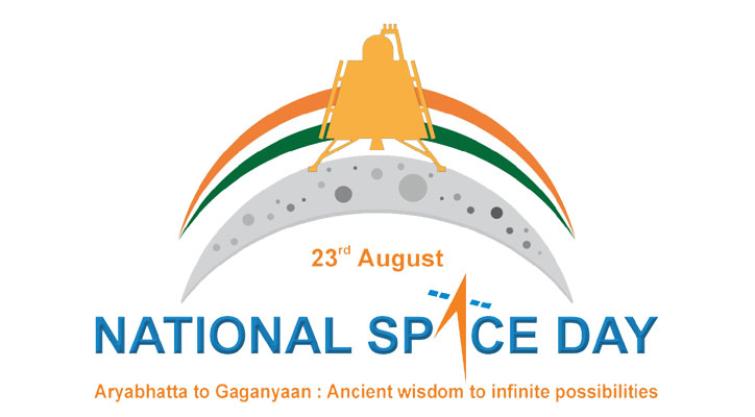By FnF Correspondent | PUBLISHED: 23, Aug 2025, 17:28 pm IST | UPDATED: 23, Aug 2025, 17:28 pm IST
 New Delhi:
New Delhi:
As India celebrates its second National Space Day, the nation reflects on its remarkable achievements, especially the successful landing of the Chandrayaan-3 mission on the Moon’s southern pole two years ago. This historic event not only solidified India's place as a global space leader but also sparked a renewed passion for space exploration, igniting future possibilities in science and technology.
On August 23, 2023, India made history with the launch of Chandrayaan-3. The Vikram Lander's soft landing at the Moon’s southern pole made India the first country to achieve this remarkable feat, positioning the nation as a key player in global space exploration. The Pragyan Rover, deployed during the mission, successfully sent back valuable data from the lunar surface, while the landing site was named ‘Shiv Shakti’ in honor of India’s rich cultural and scientific heritage.
This milestone marked the first time any country had landed near the Moon’s southern pole, opening new frontiers for lunar exploration.
National Space Day 2025, celebrated annually on August 23, marks India’s remarkable journey from ancient astronomical wisdom to modern space exploration. The theme, "Aryabhatta to Gaganyaan: Ancient Wisdom to Infinite Possibilities," highlights the nation's rich scientific heritage, from the pioneering insights of scholars like Aryabhatta to the groundbreaking achievements of the Gaganyaan mission, India’s first human spaceflight program. It emphasizes the transformative impact of India’s space endeavors on technology, society, and global cooperation, showcasing the nation’s enduring legacy and its limitless potential for future discoveries in space.
Celebrations at Bharat Mandapam in New Delhi included high-profile sessions, exhibitions, and announcements on India’s future space goals. Additionally, the "Space on Wheels" mobile exhibitions are touring educational institutions to raise awareness of ISRO’s contributions to space science, encouraging young minds to pursue careers in space-related fields.
Two years after Chandrayaan-3’s success, India has established itself as a global space power. The country’s space programs have spurred a new era of scientific exploration, blending both research and practical applications. ISRO’s partnerships with other nations, coupled with the nation’s burgeoning private space sector, have solidified India’s position in the space race.
With upcoming missions such as the Gaganyaan (India’s first human spaceflight) slated for 2027, and plans to develop a national space station, India’s aspirations are now reaching beyond Earth’s orbit. ISRO’s continued innovations in satellite technology and interplanetary exploration are making India an essential partner in global space exploration.
A key part of National Space Day’s celebrations is the emphasis on inspiring the next generation of scientists and engineers. Educational initiatives, including space-themed quizzes, aim to engage students and motivate them to explore careers in space science and technology. The progress made by India in space exploration serves as a powerful reminder of the potential of scientific discovery and its capacity to address global challenges.
By fostering curiosity, critical thinking, and problem-solving skills, India is laying the groundwork for future breakthroughs in space science and technology.
National Space Day also underscores how India’s space endeavours contribute to societal progress. ISRO’s advancements in satellite technology have revolutionised sectors such as agriculture, disaster management, telecommunications, and climate monitoring, improving life on Earth.
The success of the Chandrayaan-3 mission, alongside India’s ongoing satellite launches, demonstrates how space technology can be leveraged to benefit humanity. As India continues to explore the Moon, Mars, and beyond, its space programs will continue to generate solutions for pressing global issues.
During his address for National Space Day, Prime Minister Narendra Modi urged India’s space scientists to prepare for deep space exploration, emphasising that unlocking the mysteries of deep space would benefit future generations. Modi’s leadership has been instrumental in propelling India’s space ambitions forward, particularly through policy reforms that have made the country’s space sector more robust.
He also challenged the private sector to contribute more, calling for startups to innovate in the space sector and increase India’s launch capacity. With India’s growing private space sector and ISRO’s increased collaboration with international space agencies, the nation is poised for even greater advancements in the coming years.
India’s space journey has been nothing short of extraordinary. From the successful Chandrayaan-1 mission in 2008 to the Mars Orbiter Mission (Mangalyaan) in 2013, India has consistently demonstrated its capability to achieve scientific milestones. The upcoming Gaganyaan mission, along with plans for a space station, further highlights India’s ambitions.
In addition to lunar and interplanetary exploration, India is working on the next-generation launch vehicles, which will significantly increase the country’s payload capacity. By 2035, India plans to have its own space station, marking another significant leap in its space odyssey.
National Space Day 2025 serves as a reminder of India’s remarkable space achievements, spearheaded by the Chandrayaan-3 mission. As the country forges ahead into the cosmos, it remains committed to leveraging space technology to solve global challenges and inspire future generations. With ongoing innovations, increasing international collaborations, and an ambitious vision for the future, India’s space journey is just beginning.

by : Priti Prakash
The year 2025 dawned with New Delhi gazing lovingly into the mirror of its own expectations. After a...